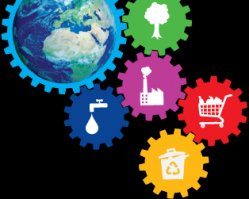Environmental and Resource efficiency Issues
To answer this question properly requires a considerable amount of presentable data in graphs, charts and the like. Let's try and summarise what would be a justifiably long answer.
The lack of efficiency with resource use is one of the main reasons for environmental degradation in the first place. Plastics are ruining ocean ecosystems, with an island the size of the USA floating in the pacific made up of man made plastic: to read more.
We are throw away consumers and our habits, along with extremely high levels of production just to keep the economy afloat, is systematically degrading the environment and is the main reason for environmental degradation. We have to combat consumerist habits to enable an efficient society that considers long term quality over short term access and mass buying.
So they're just a few of hundreds of examples of humanity being inefficient with resources on Earth.
You ask why they are important?
Because we are reaching a point where our actions will lead to considerable consequences. A mammoth increase in CO2 and methane levels due to our energy demands and food demands (mainly beef) have primary effects such as temperature increase, and host of secondary effects such as deforestation (for grazing and crops), hydraulic fracturing (scarring landscape potential causing seismic activity to get to natural gas), Greenland and Antarctic Ice sheet melting (changing saline concentration in oceans, affecting warm/cold currents, also sea level rise as an obvious cause of mass displacement in the future).
Among other reasons, the above is the 'why' to the resource efficiency debate. If we continue to innovate renewable technology, cleaner transport, and decrease demand for meat (increase taxation on beef), we could stagnate current CO2 levels at a level that would not be catastrophic. Let's hope governments the world over are strong enough to resist short term monetary gain or stability for the sake of human existence in the long term.










